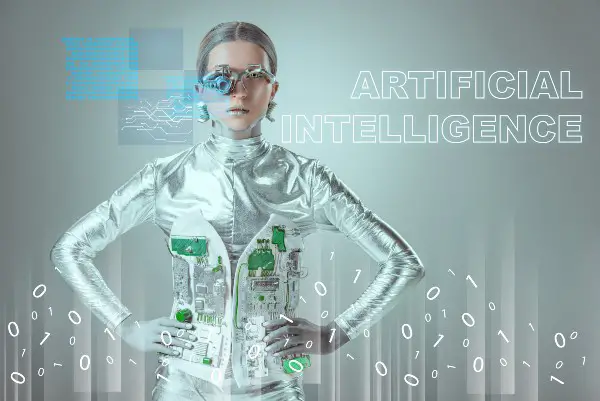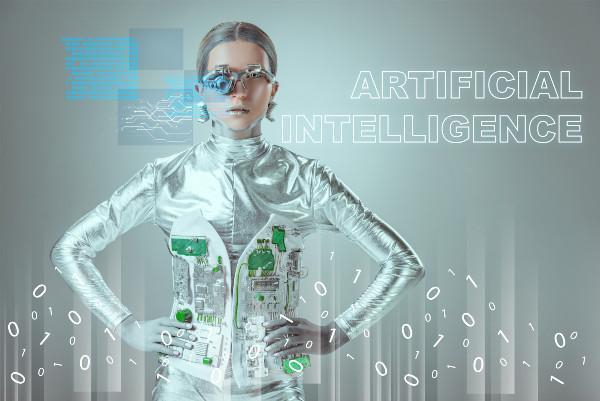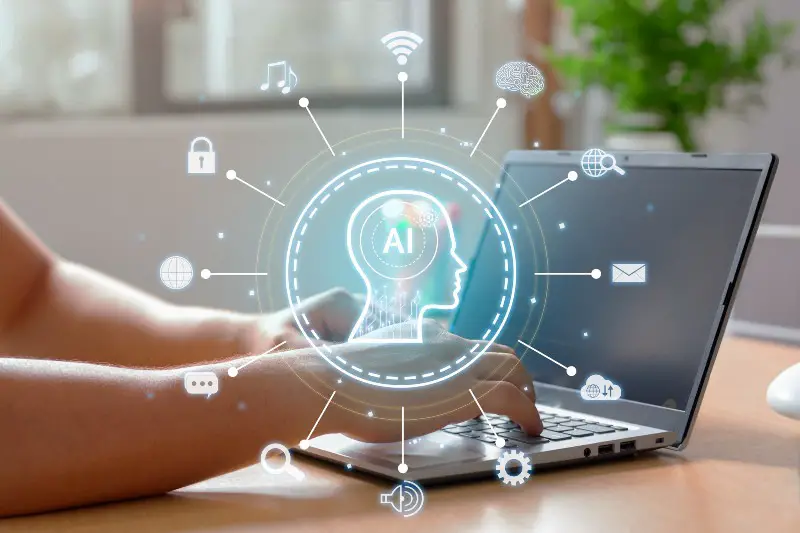Introduction
As we delve into the modern digital era, the influence of Artificial Intelligence (AI) in reshaping the global business landscape and economy cannot be understated. AI, the technology that enables machines to imitate human intelligence, is no longer a futuristic concept; it’s a current reality with significant implications for business operations and economic dynamics. This blog post will unravel the impact of AI across various sectors, from business intelligence and finance to e-commerce, global economics, and entrepreneurship. As professionals navigate this transformative wave, understanding the intricate role of AI in these spheres becomes paramount.
The Definition and Role of AI in Business Intelligence
Artificial Intelligence is fundamentally transforming business intelligence (BI), a technology-driven process for data analysis that delivers actionable insights to help corporate executives, business managers, and other end-users make informed business decisions. BI traditionally involves data mining, analytical processing, and reporting, but the advent of AI has added a new dimension—predictive analysis and intelligent decision-making.
AI, particularly machine learning and deep learning, allows businesses to predict trends and outcomes based on vast amounts of data, thereby enabling proactive decision-making. For instance, IBM’s Watson Analytics leverages AI to deliver predictive insights, making data analysis accessible to a broader range of business users. In essence, AI is redefining BI, transitioning from a descriptive and diagnostic tool to a more predictive and prescriptive aid, empowering businesses to foresee and shape the future.
Step into the fascinating world of the present, where artificial intelligence (AI) is not a distant dream, but a thrilling reality. Experience the seamless integration of AI in your everyday gadgets – your smartwatch, the intuitive smart speaker, the diligent security alarm, or the customer service chat box – all are manifestations of the awe-inspiring AI technology. Curious about the behind-the-scenes of AI creation? Pondering if AI is actually real? The enlightening ‘Artificial Intelligence For Dummies’ has all the answers you seek.
Commencing with a fundamental understanding of AI, this reference demystifies the intricate topic of AI for you. From the usage of data, algorithms, to the specialized hardware, the book is an easy-to-understand guide to the universe of AI that breathes life into the devices you simply can’t do without.
Here’s what the book promises to offer:
- Debunk the hyperbole surrounding artificial intelligence and get a true picture
- Delve into the astonishing capabilities of AI and learn about its boundaries
- Learn how AI accelerates data collection and analysis, enabling faster, informed decisions
- Explore how AI breathes life into hardware applications such as drones, robots, and vehicles
- Discover the potential applications of AI in diverse fields like space, medicine, and communication that are on the horizon
It’s worth noting that nearly 80% of the devices you interact with on a daily basis rely on some form of AI. While you don’t need to understand AI to use your smart speaker or engage with a bot, possessing knowledge about its inner workings will undoubtedly make you feel smarter. So, why wait? Grab this accessible guide today and unravel the captivating secrets of AI!
AI in the Financial Industry: A Revolution in the Making
Artificial Intelligence is igniting a revolution in the financial industry, streamlining operations, improving customer service, and enabling predictive risk analysis. AI-powered chatbots, for instance, are enhancing customer interactions, providing quick responses to inquiries, and facilitating transactions. An excellent example is Bank of America’s Erica, a virtual financial assistant that uses predictive analytics and cognitive messaging to provide financial guidance to over 10 million users.
In addition, AI is enabling more accurate fraud detection and risk assessment. Machine learning algorithms can analyze vast amounts of data, detect anomalies, and predict fraudulent transactions, thus ensuring security and trust in financial operations. PayPal, for instance, uses machine learning for real-time fraud prevention, analyzing millions of transactions and rapidly identifying suspicious activities.
How AI is Reshaping E-commerce
Artificial Intelligence is a catalyst for growth in the E-commerce industry. AI applications are reshaping online shopping, offering personalized experiences, efficient customer service, and optimized operations. One example is AI-powered recommendation systems used by platforms like Amazon. These systems analyze customers’ browsing and purchasing patterns to suggest items they might be interested in, enhancing the shopping experience and increasing sales.
AI is also driving automation in E-commerce. From chatbots for customer service to AI-driven inventory management systems, these applications improve operational efficiency, reduce costs, and enhance customer satisfaction. For instance, eBay’s ShopBot, a personal shopping assistant, uses AI to interact with customers and help them find the best deals.
How might AI-based tools impact the future job market for tax preparation professionals?
The Influence of AI on the Global Economy
Artificial Intelligence is becoming an engine of economic growth. According to a report by McKinsey Global Institute, AI could add about $13 trillion to the global economy by 2030, accelerating annual global GDP growth by about 1.2 percent. This growth stems from AI’s potential to drive productivity improvements, create new business models, and provide value-added services.
However, the economic impact of AI is not uniformly distributed. Countries that lead in AI adoption stand to gain the most, while those lagging may experience less growth or even negative effects. Policymakers, therefore, need to address issues like AI readiness, workforce adaptation, and regulatory frameworks to ensure inclusive growth.
On the flip side, AI is also providing new tools to support entrepreneurship. AI-driven platforms are making it easier to start and scale businesses, from automating administrative tasks to providing data-driven insights for strategic decision-making. For instance, HubSpot uses AI to automate marketing, sales, and service tasks, freeing entrepreneurs to focus on growing their businesses.
However, it is essential for entrepreneurs to understand that AI is not a magic bullet. Successful entrepreneurship in the AI era requires a strategic approach, a focus on human-AI collaboration, and an understanding of AI’s potential and limitations.
AI and Entrepreneurship: A New Business Landscape
Artificial Intelligence is dramatically altering the entrepreneurial landscape, providing new opportunities and challenges for startups. AI is enabling entrepreneurs to solve complex problems, create innovative products, and disrupt traditional industries. Companies like Zipline, for example, are using AI-driven drones to deliver medical supplies in hard-to-reach areas, revolutionizing healthcare delivery.
Yet, navigating the AI landscape can be challenging for entrepreneurs. It requires technical expertise, access to vast amounts of data, and substantial investment. Moreover, issues like data privacy, security, and ethical considerations add complexity to the entrepreneurial journey in the AI era.
Conclusion
The power of Artificial Intelligence is redefining industries and economies across the globe. Its potent influence is being felt in business intelligence, financial services, e-commerce, and entrepreneurship, paving the way for a new era of innovation and economic growth. AI’s impact on e-commerce is remarkable, driving personalization and automation, enhancing customer experience, and boosting sales. In the global economy, AI promises substantial growth, but its distribution remains a challenge. AI’s role in entrepreneurship is two-fold, presenting both opportunities and challenges for startups navigating this exciting yet complex landscape.
At its core, AI offers a toolset that can be harnessed to generate value, solve problems, and drive innovation. However, harnessing its full potential requires understanding its capabilities and limitations, investing in AI readiness, and addressing regulatory and ethical considerations. In a world increasingly driven by AI, those who can effectively leverage this transformative technology will lead the way into the future.

AI Horizon: Transforming Healthcare, Education, and Robotics
81 / 100 Introduction Artificial Intelligence (AI) is undoubtedly the buzzword of the century, making waves in various industries, from healthcare to education and even

Exploring the Intersection of Artificial Intelligence in Healthcare: A Tech Enthusiast’s Perspective on Machine Learning and Privacy
: Discover the transformative role of artificial intelligence in healthcare, where machine learning meets the critical challenge of privacy and security. This insightful post explores the myths, facts, and practical applications of AI in medical settings, offering a comprehensive understanding for tech enthusiasts and healthcare professionals alike. Dive into the world of AI-driven healthcare innovations and their ethical implications in patient care.






